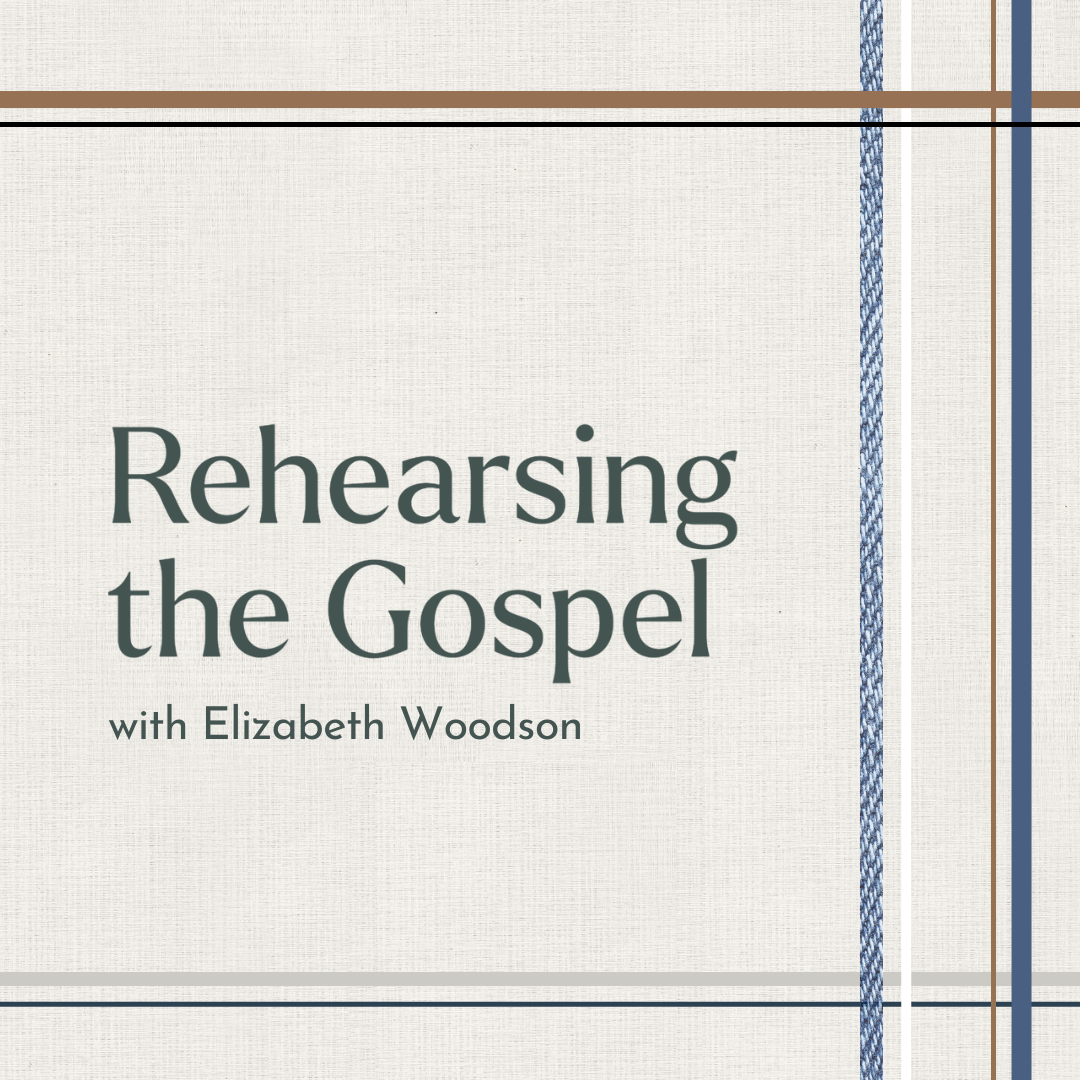Discipling with Courtney Doctor
In this episode, Hunter talks with Courtney Doctor about the beauty and the mutual edification of discipleship. As they talk, you will hear Courtney’s heart for God’s Word and her passion for knowing it, loving it, being changed by it, and teaching it. We pray this episode encourages you to seek out an older or younger woman with whom you can grow in godliness.
INTERVIEW QUESTIONS
How do you define discipleship? (teaching and training in godliness; doing spiritual good to one another)
What is the significance of being a disciple of Jesus in order to make disciples of Jesus?
How are we a part of a bigger story? How do we get to participate in the big story of the Bible as we go about these discipling relationships?
What is the significance of Scripture in our discipling relationships?
How do we make disciples with the story of redemption?
How do we give women true, gospel-grounded advice and remind them of the bigger story of redemption as they're wrestling through various challenges in their life?
What encouragement do you have for the woman who feels inadequate for the task?
What are some practical things you've found helpful as you engage in discipleship relationships?
How can we help foster a culture of discipling in our churches?
Who has had the greatest impact on the way you make disciples/think about this topic?
NOTES & QUOTES
“Discipleship is teaching and training in godliness in the context of real relationship.”
“It's a mutual edification. We're building each other up in God's Word and with God's Word, but it's done in the context of real-life relationships.”
“In discipleship, what we're doing is we're taking the Word of God and we're talking about how it applies to all areas of life—how it applies to work, to exercise, to caring for aging parents, to parenting, to marriage, to shopping. How does the gospel impact each and every moment of our days? In a discipleship relationship those are the kind of things we're going to be talking about and trying to discern and apply in our lives.”
“First and foremost, we're called disciples of Jesus. He's the One ultimately that we're all following. He's the One to whom we want to have our lives conformed. We want the mind of Christ, the heart of Christ. And so in these secondary discipleship relationships, we're all pushing towards the same goal of following Jesus more faithfully and more obediently.”
“Look to people that are a little bit further down the path and say, ‘How did God's Word sustain you? How did God's Word change you? How has the Spirit of God moved and worked in your life?’”
“We're pushing each other towards conformity to Christ.”
Insight #1—Lauren Bowerman:
“Discipleship is simply pressing one another toward conformity to Christ. I love that. If we are called to disciple one another, to push one another to model Christ, we have to first ask, ‘What do we see in Christ’s life? What kind of characteristics did he model?’ In order to know what we are called to reflect, we have to know what Christ’s life was like. So to do this we go (of course!) to the Word. What does Scripture say about the life, work, and heart of Christ?
Christ was characterized by both divinity and humility; both holiness and lowliness. Paul in Philippians 2:5–8 calls believers to “Have this mind among yourselves, which is yours in Christ Jesus, who, though he was in the form of God, did not count equality with God a thing to be grasped, but emptied himself, by taking the form of a servant, being born in the likeness of men. And being found in human form, he humbled himself by becoming obedient to the point of death, even death on a cross.
In one of my favorite verses about Jesus in Scripture, we see that Jesus is gentle. In Matthew 11:29, Jesus says, “Take my yoke upon you and learn from Me; for I am gentle and humble in heart, and you will find rest for your souls.
Scripture tells us that Jesus is both true in nature and that he is truth itself. Jesus himself says in John 14:6, "I am the way and the truth and the life. No one comes to the Father except through me.
We see in the Gospels Jesus’ heart of compassion for his people. Matthew describes Jesus’ journey through towns this way: “And Jesus went throughout all the cities and villages, teaching in their synagogues and proclaiming the gospel of the kingdom and healing every disease and every affliction. When he saw the crowds, he had compassion for them, because they were harassed and helpless, like sheep without a shepherd” (Matt. 9:35–36).
The prophet Isaiah describes the lowly posture of Christ as the Man of Sorrows, saying that Jesus “had no form or majesty that we should look at him, and no beauty that we should desire him. He was despised and rejected by men, a man of sorrows and acquainted with grief; and as one from whom men hide their faces, he was despised, and we esteemed him not” (Isa. 53:2-3).
Hebrews shows us that Jesus empathizes with us—that while he is perfection itself, he is also understanding of weakness: “For we do not have a high priest who is unable to sympathize with our weaknesses, but one who in every respect has been tempted as we are, yet without sin” (Heb. 4:15).
Jesus is love itself (1 John 4:8), and he demonstrated the epitome of love in his sacrifice of his own life (John 15:13).
He is the Lion and the Lamb. Revelation 5:5 tells us that he is the conquering “Lion of the tribe of Judah, the Root of David.” He is the lamb who takes away the sins of the world (John 1:29), in fact, he is the lamb slain before the foundation of the world (Rev. 13:8).
This is the Christ. This is who we are called to tether our lives to and to wholeheartedly imitate. May we do so, and may we press one another to ever do the same.”
“I remember having a paradigm shift when someone said to me, ‘Instead of asking, ‘Lord, what is your will for my life?’ we need to switch the question and say, ‘Lord, how can my life serve your will?’”
“We don't seek our kingdom, we seek his kingdom. We don't seek our name, we seek his name. That's part of discipling each other, and discipleship is really pointing people to Jesus and to this conformity to his mission, this story that he's writing from beginning to end.”
“Discipleship is the process of walking this thing out together and cheering each other on as we align our lives more and more to this mission.”
“We have to have the Word of God at the center of these relationships because that's the power of God. Not us. We don't want to be offering just our own good advice.”
“If we are not pushing each other back towards the Word of God, then we are really just robbing these relationships of the power that the Word is. And so it needs to be the center of these relationships.”
“The older you get, the more road you have to look back on. You know how the hymn says, ‘How I’ve proved him o’re and o’re’? Well, the older we get, the longer we've walked with Jesus, the more we can testify to that, the more I can testify to the sufficiency of God's Word in every season and every trial.”
“The more you've walked with him, the longer you've walked with him, which doesn't happen just by getting older, but it also doesn't happen without getting older, then the more you can offer that perspective to others to say, ‘Let me testify to the faithfulness of the Lord.’ I love the song that says, ‘His faithfulness is our confidence.’ And it is, right? That's what we rest on. We bank on his faithfulness. And so to know people who have proved his faithfulness over and over in their own lives offers us all that hope and that help that we need.”
Insight #2—Lauren Bowerman:
“I love how Courtney reminded us earlier that whether we’re talking to an unbeliever or a believer…we’re presenting the same gospel message. One is the power for salvation and the other is the power for sanctification. The gospel message holds the power of life for every eternal soul.
So the question we have to ask ourselves is, are we wielding that when we speak? In our relationships, in our discipleship, are we sharing our own good advice or are we sharing the gospel message? Are we pointing with our words to ourselves or to the only One who is able to save?
As we walk with friends through difficulty, pain, and suffering, what hope are we holding up before their eyes? Are we serving up cushy platitudes like “it will get better, you’re so strong, you’re enough,” or are we honestly telling them, “it might not get better, you might not have the strength, you actually are not enough… but I know the One who is with you in every moment of pain, I know the One who is enough, I know the ending of this story of brokenness and suffering, and the ending is redemption and restoration and relationship.”
Our relationships with our sisters in Christ are so precious; it is a gift to be able to disciple and to be discipled and to press one another to grow in godliness and gospel-remembrance. So sisters, let’s ensure that our words are seasoned with the truth and hope of the gospel. As we walk through this life and encounter stories of God’s faithfulness to us, let us be bold to share them, pointing always and ever to the One who is orchestrating every piece of them. Let’s be bold in sharing, as the hymn says, “How I’ve proved Him o’er and o’er.” Let’s share God’s faithfulness to us, our proofs of his goodness, and the traces of his sustaining hand in our lives.
God is continually working in our individual lives, and his ultimate saving work in Christ is forever secured and finished. Let’s share with boldness both his redemptive work in our lives and his ultimate act of redemption in Christ. Let’s pursue discipleship relationships where we can testify of who he is and press others to know him and love him more and more.”
“We are plan A. This is the task that Jesus left the church. It's the charge: to go and make disciples.”
“I don't actually think it's an optional pursuit to live life in vibrant discipleship relationships. And so I guess the encouragement I would say is God does not ask you to feel qualified. He asks you to obey.”
“Identify a woman in your church that you think is characterized by godliness. Not perfect, but just that loves God's Word. Run to her and ask her if she would meet with you.”
“I do think there is an overvaluing of “organic” discipleship relationships. I think we can think, ‘Oh, we don't want too much structure. We don't want a program. We just want these things to happen organically.’ Well, the reality is women need structure to try new things.”
“The edification is mutual. I am pursuing Christ with you. We are both, Lord willing, by his grace and by his Spirit, moving towards more maturity in Christ. We're pushing each other towards that. And that's a beautiful thing.”
“To see the Word take root further in my heart and in someone else's heart in a way that we believe it more, we're applying it more, we’re clinging to the gospel more, and we're seeing each other grow in the likeness of Jesus. What in this life is better? Nothing. Nothing.”
RESOURCES
From Garden to Glory by Courtney Doctor
DISCUSSION QUESTIONS
Describe your personal experience of being a disciple of Jesus.
Where in Scripture do you see encouragement to disciple or be discipled?
Have you ever felt inadequate for the task of discipleship? What specific encouragement did you draw from this conversation?
Is there a person (younger or older) who was brought to mind as you listened to the episode? Consider initiating a conversation with them this week about entering into a discipleship relationship.
What might you do or implement based on what you learned in this episode?
EPISODES FROM THE BACK TO THE BASICS SERIES
ARTICLES FROM THE BACK TO THE BASICS SERIES
IMPORTANT NOTE
Journeywomen interviews are intended to serve as a springboard for continued study in the context of your local church. While we carefully select guests each week, interviews do not imply Journeywomen's endorsement of all writings and positions of the interviewee or any other resources mentioned.
Affiliate links used are used where appropriate. Thank you for supporting the products that support Journeywomen!
FOR MORE OF JOURNEYWOMEN
Subscribe: Apple Podcasts | Spotify
Follow Us: Instagram | Facebook
Support the podcast by writing a review

















